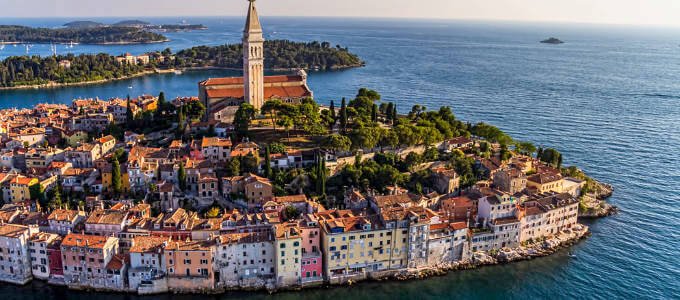Got parents, grandparents, or great-grandparents hailing from Croatia? In today’s episode, we investigate how you can get Citizenship By Descent in Croatia in 2023…
Join Sovereign Confidential to…
Getting Citizenship By Ancestry in Croatia
As many world travelers would know, the Republic of Croatia is a spectacular destination. The country boasts a diverse mainland, a picturesque archipelago of 1,200 islands, and crystal clear seas. The world-famous coastal town of Dubrovnik is located in Croatia, as is Split, another popular coastal destination.
Many Westerners describe Croatians as “fiercely protective and nationalistic.” It’s practically impossible for a foreigner to acquire Croatian citizenship and become a Croatian citizen through the “regular” naturalization route, which, on paper, should only take living in the country for eight years.
Yet, at the same time, Croatia has one of the most generous citizenship by ancestry laws, inviting members of the Croatian diaspora abroad to come back home, or at least to forge stronger ties with their ancestral motherland.
Moreover, thanks to new legislative changes that took effect in 2020, this process of acquiring Croatian citizenship by descent has gotten a lot easier, and the country has thus seen a significant spike in ancestry-based citizenship applications in 2021.
Because let’s face it, who wouldn’t want a second passport in such a beautiful country?
How to Get Croatian Citizenship by Descent?
The Croatian Citizenship Act governs the rules surrounding nationality (here is the English version).
Let’s start with the situation where one of your parents is a Croatian citizen.
A child acquires Croatian citizenship automatically (by origin):
- If both parents are Croatian citizens at the time of the child’s birth, OR
- If one of the parents is a Croatian citizen at the time of the child’s birth, AND the child is born in Croatia.
If you were born outside of Croatia to only one Croatian parent, you could still become a citizen, but you need to take an extra step and do it in a timely manner.
The Croatian Citizenship Act obligates one to register as a Croatian citizen in one of the country’s consulates abroad before one turns twenty-one.
But even if you are older than twenty-one already, you still have options.
If you were born after October 8, 1991, the latest amendment to the citizenship law allowed you to register as a citizen before December 31, 2021, even if you were older than twenty-one. Those who managed to submit their applications during this time had a chance to acquire Croatian citizenship without many additional complications.
If none of the above situations apply to you, you can become a Croatian citizen through your descent, as described by Article 11 and Article 16 of the law.
Article 11 — Descendants of a Croatian Emigrant
To qualify for Croatian citizenship under this particular article, you must have a Croatian ancestor born in Croatia. Technically, there is no limit to the number of generations you can refer back to.
But in practice, like in any country, establishing the right paper trail can be hard if your ancestor left Croatia more than, say, a century ago.
Curiously, another requirement states that your Croatian ancestor must have left Croatia permanently. Your parent, grandparent, great-grandparent, etc., must have been a “Croatian emigrant.”
You can prove it in multiple ways. Join Sovereign Confidential to discover the various methods for doing this.
Finally, you’ll also need to prove your lineage to your ancestor through applicable marriage, death, and birth certificates.
But in some cases, Article 11 will not help you even if your ancestor was a Croatian citizen.
Similarly, while it’s not written in the law anywhere, you will generally experience an uphill battle applying if your ancestor immigrated to one of the countries that had bumpy relationships with Croatia in the past, such as Turkey.
Article 16 — Connection or Belonging to the “Croatian People”
Even if you cannot trace yourself to one of your ancestors who left Croatia to live in another country, not all is lost.
Article 16 of the law is much broader in scope and can still help you.
Under it, it’s enough for your ancestor to be “ethnically” Croatian, regardless of their place of birth. And there are multiple ways of proving that your ancestor was of Croatian ethnicity.
Join Sovereign Confidential today to learn more about the various ways in which you can prove your Croatian heritage — and discover yet another relatively unknown way of becoming Croatian on the basis of cultural connection to the country.
The Application Process
Similar to many other countries, Croatian citizenship by descent can be acquired after you prove you are eligible for it. That means it’s your responsibility to collect all the documents that confirm your ancestor’s affiliation with the country and their Croatian nationality.
It is best to do this work before you start the application process. If you don’t have enough proof to support your application, you may be setting yourself up for a time-consuming process that will result in rejection.
To avoid that, you can consult with a legal representative to evaluate whether or not your Croatian citizenship application provides enough evidence to be approved by the Croatian Ministry of the Interior.
What documents will you need to include in your citizenship by descent application?
- A copy of your valid ID.
- The application form.
- A copy of your birth certificate no older than six months.
- Your Curriculum Vitae (CV, written out in Croatian). In addition to your employment status, education, and residence, this document should include information about your marital status, children, parents, and any relatives who may have acquired Croatian citizenship in the past.
- The Croatian citizenship certificate of your ancestor called domovnica.
- The marriage certificate of the ancestor.
- Documents that confirm the lineage between you and your Croatian ancestors. This may include their birth certificate(s) as well as birth certificates of all the ancestors that connect you (remember that not all of them have to be of Croatian nationality, as long as you have at least one person in your family tree that was Croatian.)
- The explanation of your reasons why you’re applying for Croatian citizenship. It’s an excellent chance to explain why your ancestors left the country and why it is important to you to obtain Croatian citizenship.
It’s also imperative to ensure your documents meet the formal criteria.
- Documents should be original.
- They should have an apostille.
- The should also be translated and officially notarized.
The application process can be lengthy and costly, depending on the strength of your case. If your grandparent was Croatian, it’s easier to go through the process because acquiring necessary documentation is usually straightforward.
The case gets more complicated if you’re basing your application on ancestors that lived more than three generations before yours.
The Pros and Cons of Croatian Citizenship
Croatia is not only a beautiful destination for holidays. It’s a country with history, great cuisine and friendly people. One of the most significant advantages of having Croatian citizenship is having free access to the European Union.
Since Croatia is a member of UE, you can travel to other UE countries with just your passport or ID in your hand.
Additionally, when you apply for Croatian citizenship by descent, you don’t have to renounce your other citizenships, which is a huge advantage!
Overall, you have more options and safety when you obtain dual citizenship, and Croatia is a relatively safe place to live. When things get uncertain, you always have a place to go.
When it comes to the disadvantages of having Croatian citizenship, there is not much we could say. It’s always advisable to check what your tax situation will look like with another citizenship. Evaluating your financial situation may be necessary before applying to avoid any surprises.
Apart from that, you should be very content with a Croatian passport.
What Is the Approximate Timeline for Applying for Croatian Citizenship?
Our contact on the ground recommends being patient.
In the last couple of years, a lot of requirements surrounding citizenship by ancestry have become more favorable for the applicants. The language and culture tests, for example, are no longer required under either of these Articles.
That’s a big deal for members of the diaspora who don’t know the Croatian language anymore.
But these provisions have resulted in a flood of new applications.
The whole process — from submitting your case to the consulate to the final approval in Zagreb — will likely take two years or more.
Additionally, what’s remarkable about Croatian citizenship by ancestry is that besides your children, your spouse also becomes eligible for a Croatian passport.
Your spouse may have absolutely no relation to Croatia. They may not speak a word of Croatian and may have never even visited the country.
But they can still end up with a Croatian passport – how awesome is that?
Most citizenship by ancestry programs is not nearly as generous. In the case of Croatia, the process of naturalization is also fairly demanding.
Citizenship by Naturalization
To acquire Croatian citizenship by naturalization, one has to fulfill the following requirements
- They must be eighteen years old;
- They must be released from foreign citizenship or submit proof that they will acquire release if granted Croatian citizenship;
- They have lived and have had a registered residence in the Republic of Croatia for at least eight years without interruption until the submission of the request and have been granted foreigner status with permanent residence;
- They are proficient in the Croatian language and Latin script and are familiar with Croatian culture and social norms.
As you can see, these requirements are far more demanding to meet, and for many, the Croatian citizenship by descent programs are the only way to apply for Croatian citizenship.
The Bottom Line
The recent changes to Croatia’s citizenship law make the country an incredible option for obtaining Citizenship by Ancestry. And as an added bonus, new Croatian citizens of descent (and their spouses) get to keep their existing nationality.
This is a big plus, as the country generally doesn’t permit dual citizenship for people who obtained Croatian citizenship by naturalization.
But as with all programs of this kind, it’s not guaranteed that the rules won’t change at a moment’s notice. So if you’ve got Croatian roots, make today the day you take action.
Our most recent 74-page SMC Black Paper covers scores of countries offering Citizenship By Ancestry programs in Southern Europe and the Balkans and covers the Croatian Citizenship By Ancestry Program in detail.
To gain access to this invaluable resource, join Sovereign Confidential today.
Yours in Freedom,
Team Sovereign Man
PS: Enjoying the weekly Knowledge Series? Why not give us a star-rating below?








